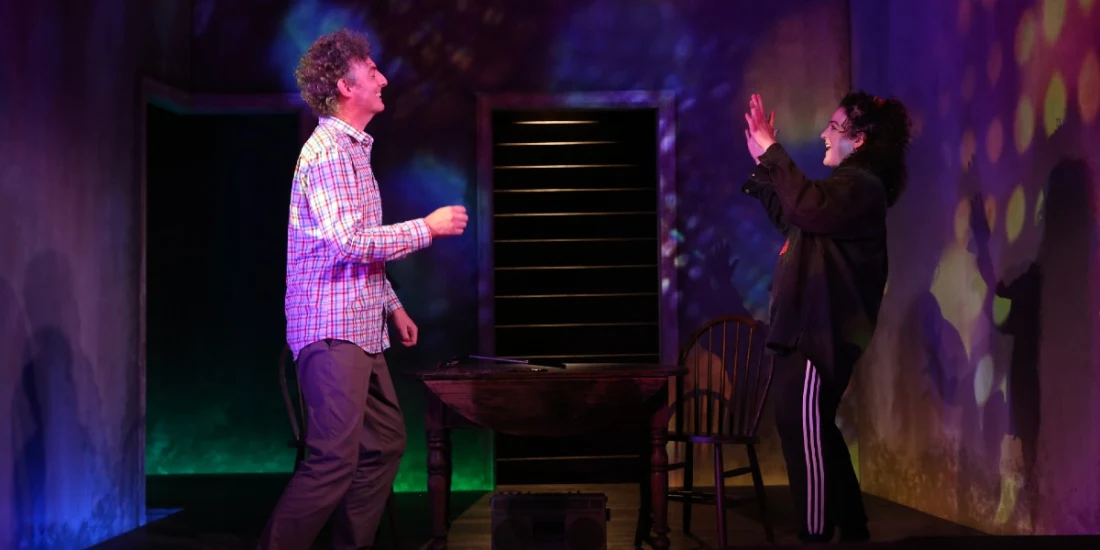'Autumn Royal' review — an endless waiting game bogged down by the past
The 2017 world premiere of Autumn Royal in Ireland was met with critical acclaim, but Kevin Barry's play is making its North American premiere at the Irish Repertory Theatre in an altogether different world, one where the premise might be a tougher sell. The play sees 30somethings May and Timothy, who have been taking care of their ill father presumably for years, gripe about wanting to get rid of him and move on with their lives. We've collectively mourned so much illness and death these past two years, the plot can seem callous on paper. Not to mention that we're finally getting back out of our houses again, perhaps finding theatre a welcome reprieve from cabin fever, just to be brought face-to-face with characters being almost driven mad with it.
But the familial resentment and existential dread aren't the issue with Autumn Royal. What's unfortunate about the play is that, at a swift 70 minutes and with a dark comedy billing, Autumn Royal had the potential to be a quick-witted show that you realize you've laughed through before the gloom sinks in. There are strong comic moments: the pair watching their old ceiling rain down dust; Timothy making a dating app video; and their father running like the wind, pantsless, into a busy parade. The punchy one-liners delivered throughout by a fiery Maeve Higgins as May are source of laughs. (Timothy, played by an endearing John Keating, is often the butt of her insults.)
Their sibling dynamic feels authentic, as the two switch from gossiping about the neighbors to arguing to dancing to '80s music. They know how to get under each other's skin, too: May by puncturing Timothy's Australia dream, and Timothy by pointing out that she's not as ready to move on from their home as she says. But not even these fantastic actors can pull Autumn Royal out from the weight of backstory and busy projection design by Dan Scully.
Barry's background as a novelist looms large, and the relatively simple plot — the two ship their father off to the titular nursing home and it doesn't go as planned — gets bogged down with long, descriptive soliloquies in between scenes. These serve as glimpses into the character's minds, and multiple focus on a long-absent mother. The structure seems meant to illustrate the siblings' complex feelings — they don't like him and want to move on, but have baggage they can't shake — but the backstory is dense and hard to follow, slowing the play to a debilitating pace.
One can't help but wonder why May and Timothy can't get out more if they can spend so much time bickering and reminiscing. After all, their bedridden father gets farther away than they do. This is where the nihilistic influence of Samuel Beckett's Waiting For Godot is apparent, as Barry sets his two characters in a single, sparse room that they seemingly can't escape. Unlike Vladimir and Estragon, they truly can — physically, at least, though their journeys outside the house are short. Timothy leaves in the first scene to pick up his father's medications and returns with the lot on a silver platter as though it's a fresh feast from a special outing. Later, they pore over the Yellow Pages of nursing homes and discuss the options like exotic travel destinations, and Timothy's description of a real exotic destination — Australia, where he eventually dreams of living — makes the continent seem like Eden, perfect and woefully unattainable.
Whether it's guilt, uncertainty, fear, or something else that's held them back all this time is unclear, but it's best not to worry about that, as the time given to explanatory monologues ultimately muddles the show more. The strongest moments are in the eternal present, where May and Timothy may well natter on at each other for eternity.
Photo credit: John Keating and Maeve Higgins in Autumn Royal. (Photo by Carol Rosegg)
Originally published on
